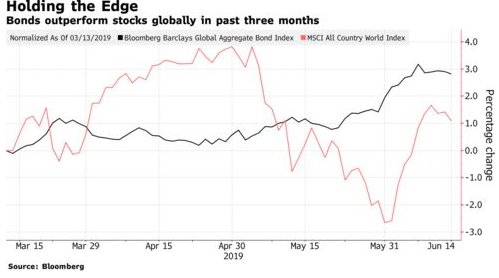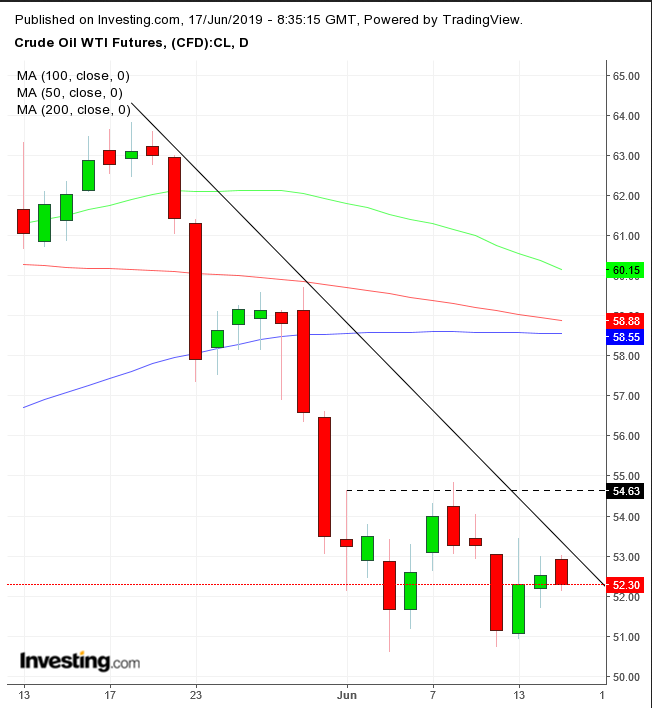- U.S. futures, European shares linger around neutral levels as Fed rate cut outlook seesaws
- Yields climb ahead of Fed meeting
- Oil drops as specter of weak demand offsets mounting Middle East headwinds
Key Events
Futures on the S&P 500, Dow and NASDAQ 100 opened the week higher and European stocks trimmed down Friday’s losses this morning, ahead of a week filled with potential catalysts: an ongoing trade war, major central banks policies decisions and tensions brewing in the Middle East.
The STOXX 600 initially inched higher, with banks including Deutsche Bank (DE:DBKGn) leading gains. However, airline shares weighed down on prices—causing them to slip below neutral levels by late European morning—after soft guidance from Germany’s Deutsche Lufthansa (DE:LHAG) added to the recent string of profit warnings in the sector.
In the earlier Asian session, stocks lingered above weekly lows, but received a boost after Hong Kong Chief Executive Carrie Lam apologized for the way the infamous extradition bill—which caused nearly two million people to take to the streets—has been handled by the government. The move pushed the Hang Seng 1.4% higher, helping it close 0.40% in the green. However, calls for Lam’s resignation escalated.
Global Financial Affairs
On Friday, U.S. stocks closed lower after better-than-expected retail sales data prompted investors to question the forgone conclusion of a Fed cut. Once again, traders focused on a short-term outlook rather than a sustainable long-term economic expansion.
Investors have built a lot on the assumption that the Fed would cut rates: have they been building their forecasts on sand? Friday’s robust retail sales, which count for two thirds of GDP, demonstrated that consumers are well positioned to keep feeding growth, dispelling the inevitability of rate cuts.
Markets were caught in a whirlwind of conflicting drivers last week: rising trade tensions on the one side and and mounting speculation of a Fed cut on the other, which uncharacteristically supported stocks and bonds simultaneously.

The yield on 10-year Treasurys climbed for a second day since Saturday, while European sovereign bonds were mixed ahead of policy meetings for the Federal Reserve, the Bank of Japan and the Bank of England. Overall, bonds have been outperforming stocks globally in the past three months.
Meanwhile, geopolitical tensions are rising fast. On the trade front, U.S. Commerce Secretary Wilbur Ross doesn’t expect a trade resolution even if U.S. President Donald Trump and Chinese President Xi Jinping do meet at the G-20 summit in Osaka this month.
On the Middle East front, Republican Senator Tom Cotton urged Trump to order a military strike against Iran over recent attacks against oil tankers in the Gulf of Oman. Meanwhile Secretary of State Mike Pompeo vowed the U.S. will protect shipping—after sending warships to the region, which Iran characterized as “psychological warfare.”
Saudi Arabia also blamed Iran, after Abha airport was hit by a missile on Wednesday. The Saudi statement follows Iran’s recent threat to shut the Strait of Hormuz, the world’s most important oil tanker route that connects Middle-East crude oil producers, shipping 19 million barrels of oil daily—a fifth of the world's exports. Shutting the Strait of Hormuz could be considered an act of war by international law. Moreover, any instability in the area would cause prices to jump dramatically. Iran openly stated that oil will jump past $100 if the first bullet is fired in the Persian Gulf.

WTI gave up a higher open, finding resistance by the downtrend line since mid May. A climb above the $55 level would complete a small double bottom, while a close below $50 would signal a continued decline. We expect the price to stay put until the Fed decision on Wednesday. Overall, analysts pointed out that the outlook for weak demand is keeping a lid on prices, partly offsetting macro headwinds.
Up Ahead
- The Federal Reserve, the Bank of Japan and the Bank of England all set monetary policy this week, along with central banks in Norway, Brazil, Taiwan and Indonesia.
- Fed meetings begin on Tuesday, with a decision and press conference following on Wednesday. Officials are expected to debate a rate cut to shelter the U.S. economy from the downward effects of escalating global trade disputes.
- Tuesday will see a second ballot to select the successor of U.K. Prime Minister Theresa May.
- Also on Tuesday, final May CPI data comes out for the euro-area.
Market Moves
Stocks
- The Shanghai Composite Index climbed 0.2%.
- The MSCI Emerging Market Index slid 0.3%, the lowest in more than a week.
Currencies
- The Dollar Index fell 0.05%, after temporarily gaining 0.02% to the highest in more than two weeks.
- The euro rose less than 0.05% to $1.1209.
- The British pound slipped 0.1% to $1.2581, the weakest in about six months.
- The onshore yuan climbed less than 0.05% to 6.924 per dollar.
Bonds
- The yield on 10-year Treasurys gained two basis points to 2.10%, the first advance in a week.
- The yield on 2-year Treasurys increased two basis points to 1.86%.
- Germany’s 10-year yield was unchanged at -0.26%, the lowest in more than a week.
- Japan’s 10-year yield climbed one basis point to -0.124%.
Commodities
- West Texas Intermediate crude dropped 0.3% to $52.36 a barrel.
- Iron ore fell 1.6% to $103.33 per metric ton, the biggest dip in two weeks.
- Gold slid 0.3% to $1,337.73 an ounce, the largest drop in a week.
Which stock should you buy in your very next trade?
AI computing powers are changing the stock market. Investing.com's ProPicks AI includes 6 winning stock portfolios chosen by our advanced AI. In 2024 alone, ProPicks AI identified 2 stocks that surged over 150%, 4 additional stocks that leaped over 30%, and 3 more that climbed over 25%. Which stock will be the next to soar?
Unlock ProPicks AI